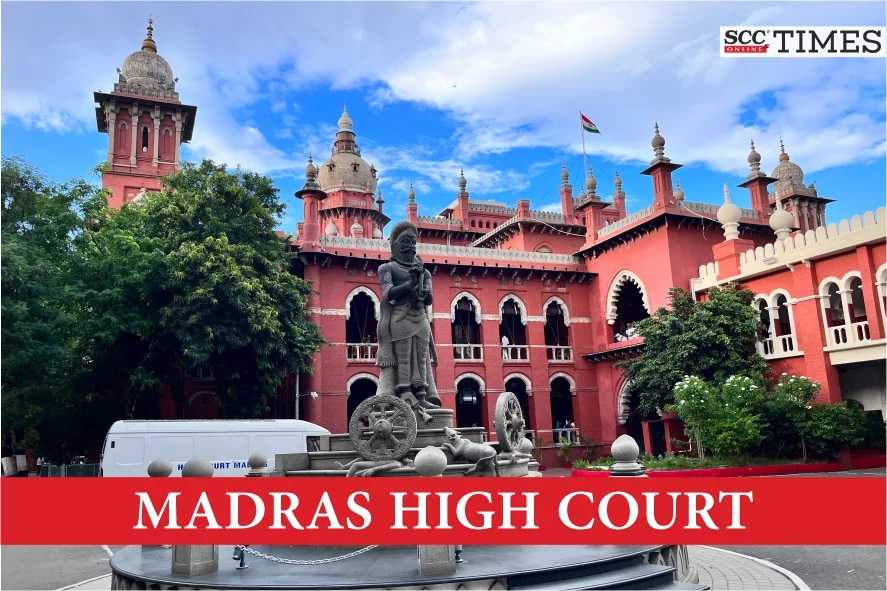Madras High Court: In a Criminal Original Petitions filed by college students under Section 483 of Bharatiya Nagarik Suraksha Sanhita, 2023 to enlarge them on bail pending investigation, A.D.Jagadish Chandira, J. recommended the formation of a Special Committee comprising statesmen, scholars, psychoanalysts, and representatives from the Departments of Human Resource Development, Higher Education, School Education, and the Police to identify and address behavioral issues in students.
The accused persons, who were students of Pachaiyappa’s College, along with certain students from Presidency College, had been repeatedly involved in altercations during their commute from outlying areas to their respective institutions. These recurring skirmishes had escalated over time, resulting in the initiation of multiple criminal cases.
The situation had taken a grievous turn with the brutal assault and subsequent death of a Presidency College student, which was allegedly attributed to the accused students.
In view of the grave circumstances surrounding the incident, this Court had directed the personal appearance of the students’ parents. Additionally, the Court, exercising its suo motu powers, had impleaded the educational authorities and the principals of the respective colleges as parties to the proceedings.
Taking note of the report submitted by the Additional Director General of Police, the Court observed that the findings revealed a total of 231 student-related criminal cases registered over the past decade. Of these, 198 cases were registered by the Greater Chennai Police, while 33 were registered by the Government Railway Police. Notably, 58 of these cases involved students from Pachaiyappa’s College, and 28 involved students from Presidency College.
The Court remarked that the most distressing aspect of the matter was revealed during its interaction with the students’ parents. They not only pleaded ignorance of their children’s conduct but also expressed that, in the hope that their children would become the first graduates in their families and thereby uplift their households, they had been spending their hard-earned money to support their education. However, without understanding the sacrifices and noble intentions of their parents or guardians, the students had engaged in criminal activities, thereby jeopardizing their own futures.
The Court further observed that, considering the immaturity of the students accused in these cases, it had granted them bail subject to the condition that they serve in the Trauma Wards of the Rajiv Gandhi Government General Hospital and the Government Kilpauk Medical College Hospital, under the supervision of the respective Resident Medical Officers.
The Court noted that the compliance reports indicated the students had actively assisted the Trauma Ward staff and, through this experience, had developed a deeper appreciation for the value of life.
Quoting the adage, “It is good to learn from your mistakes, but better to learn from others,” the Court emphasized that this incident ought to serve as a wake-up call to society at large.
The Court stated that a review of the case materials confirmed that the group clashes had primarily occurred between students of Pachaiyappa’s College and Presidency College. However, it was also observed that students from other institutions had been involved in similar incidents.
The Court noted that Pachaiyappa’s College, South India’s first and the country’s fourth oldest educational institution, had a proud and distinguished legacy. Its notable alumni included the legendary mathematician Srinivasa Ramanujan and former Chief Minister Arignar C.N. Annadurai, who had also served as a faculty member. The Court further noted that the college had the historic honor of hosting Mahatma Gandhi’s first speech in Madras. Similarly, Presidency College had produced several eminent personalities, including Nobel Laureate Sir C.V. Raman and many distinguished judges of the Indian judiciary.
In view of such rich and inspiring histories, the Court observed with deep concern that it was disheartening to witness students from these prestigious institutions becoming involved in criminal activities, thereby tarnishing the reputation of their colleges and jeopardizing their own futures.
The Court remarked that criminals are made, not born. No parent wished for their child to become an anti-social element, and dedicated teachers had consistently strived to instill ambition and good values in their students. At the same time, society could not be expected to tolerate such behavior. The root cause, the Court observed, often lay not in a lack of sympathy but in a lack of empathy. Educational institutions, therefore, must not disregard these issues simply because they occurred outside the campus or involved only a limited number of students.
After reviewing all submissions and reports, the Court concluded that the issue warranted urgent intervention by the Educational Authorities. Citing the adage, “As the twig is bent, so grows the tree,” the Court emphasized that while immediate measures must be taken at the college level, lasting solutions would require early intervention beginning from the school stage. This should include regular parent-teacher interactions aimed at identifying and addressing behavioral concerns at an early stage.
Accordingly, the Court recommended the formation of a Special Committee comprising statesmen, scholars, psychoanalysts, and representatives from the Departments of Human Resource Development, Higher Education, School Education, and the Police to identify and address behavioral issues in students.
With these observations, the Court ordered that the Criminal Original Petitions be closed.
[Chandru v. Inspector of Police, Crl.O.P.Nos.27676, 27493, 27688 & 28311, of 2024, decided on 17-04-2025]
Advocates who appeared in this case:
For Petitioners: Mr.P.Muthamizhselvakumar : Mr.S.Mohan Raj : Mr.D.Dhanasekar
For Respondent: Mr.Leonard Arul Joseph Selvam Government Advocate
For intervenor : Mr.R.Thirumoorthy






